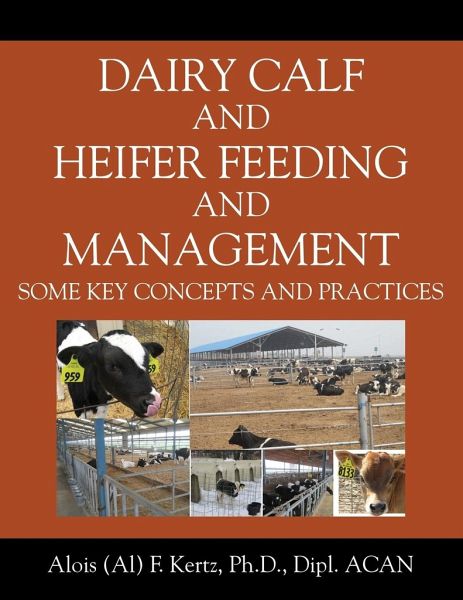
Dairy Calf and Heifer Feeding and Management
Some Key Concepts and Practices
Versandkostenfrei!
Versandfertig in 1-2 Wochen
34,99 €
inkl. MwSt.

PAYBACK Punkte
17 °P sammeln!
Looking for a technical but practical science-based book on Dairy Calf and Heifer Feeding and Management? Are you a field person such as a nutritionist or veterinarian or calf/heifer specialist, a commercial dairy or calf/heifer operation, a student, or dairy scientist? Al Kertz has spent 46 years doing calf and heifer research, making on-farm visits and evaluations, conducting dairy training of employees, interacting with scientists and technical people, publishing 17 scientific articles in this area, reading and studying the scientific literature, and writing articles since 2001 for Feedstuf...
Looking for a technical but practical science-based book on Dairy Calf and Heifer Feeding and Management? Are you a field person such as a nutritionist or veterinarian or calf/heifer specialist, a commercial dairy or calf/heifer operation, a student, or dairy scientist? Al Kertz has spent 46 years doing calf and heifer research, making on-farm visits and evaluations, conducting dairy training of employees, interacting with scientists and technical people, publishing 17 scientific articles in this area, reading and studying the scientific literature, and writing articles since 2001 for Feedstuffs (>110) and Hoard’s Dairyman (> 59). After periodic requests to publish a book in this area and with the approval of Feedstuffs, this book has been compiled by amalgamating, organizing, and editing many Feedstuffs’ articles into a book with 9 chapters encompassing an Introduction and USA Demographics, Colostrum, Milk Replacers, Calf Starters, Water, Post-weaned Transition Month, Heifers, Other Management Issues, and Evaluations. The focus of the book is on some key concepts and practices, and it can serve as a technical reference for a variety of people. While its focus is on the USA, Kertz has spent nearly 20 years doing consulting work in over 20 countries where he finds the science and applications similar, albeit in the metric system. Alois (Al) F. Kertz grew up on a small Missouri dairy farm. He earned B.S. and M. S. degrees in dairy husbandry and nutrition from the University of Missouri under the tutelage of John Campbell before completing 2 years of US Army active duty as a research Nutrition Officer, and then managing food supply for military operations in Thailand. At Cornell University, his major professor was J. T. (Tom) Reid with a Ph. D. thesis project on growth and development of cattle. That became a great platform for understanding and working with calves, heifers, dry cows, and lactating cows and their bodily changes and metabolism. In 1973, he began employment under the direction of J.P. Everett, Jr. at Ralston Purina Company. He became another mentor from whom Al began to learn about calves and heifers. The basis for this book are the many Feedstuffs columns which he has written—many of which are excerpted and edited into this book; the Young Calf Model from the 2001 Dairy NRC publication for which he was a reviewer; and the 100-year review in the December 2017 Journal of Dairy Science on Calf Nutrition and Management made possible only through the major work by 5 co-authors: Mark Hill, Jim Quigley, Jud Heinrichs, Jim Linn, and Jim Drackley. In addition, there were the on-going grounding and understanding of practical applications provided by visiting, reviewing, and developing recommendations for many dairy operations in the U.S. and in many other countries as well. These visits often provided insights into how science could meet application. That became an on-going learning process for if the science was not applicable, then maybe we did not understand the science, or how to apply it. This book is designed to be a handy reference for field people and students, and as a reference for scientists in their teaching and research to understand concepts and how they are applied to feeding and managing dairy calves and heifers.














